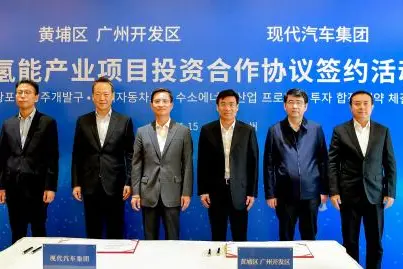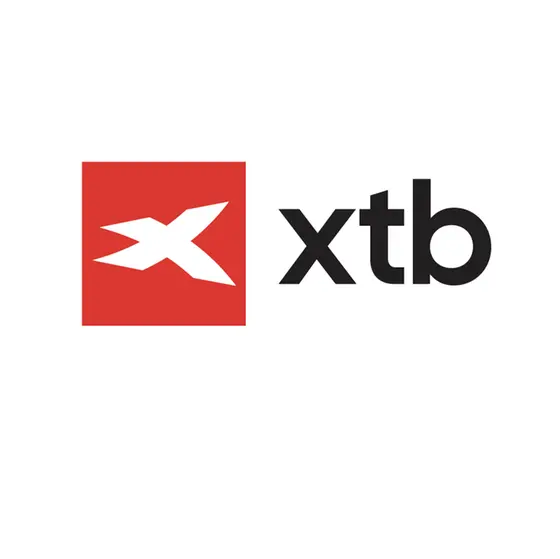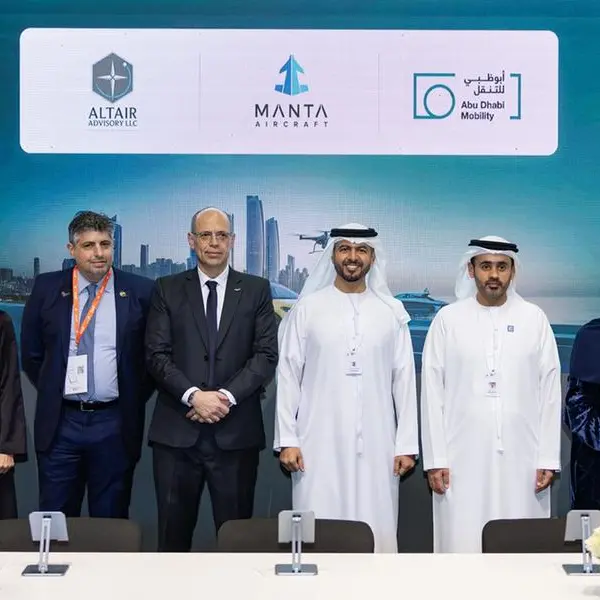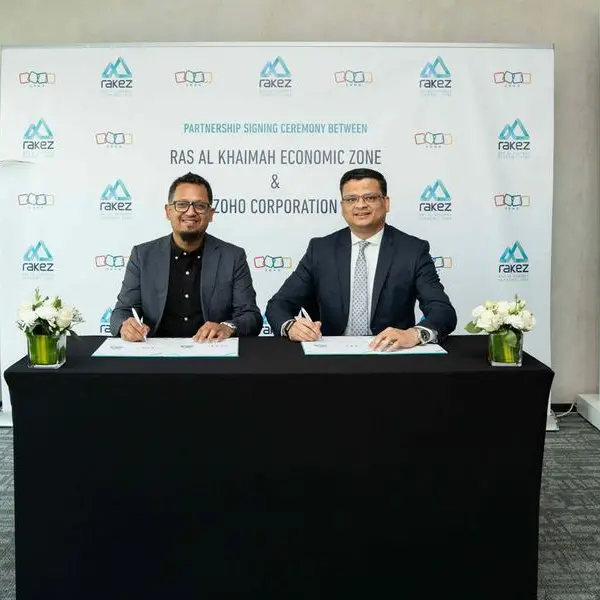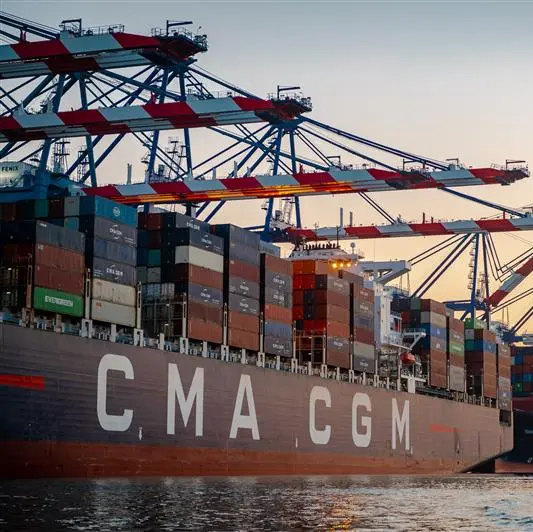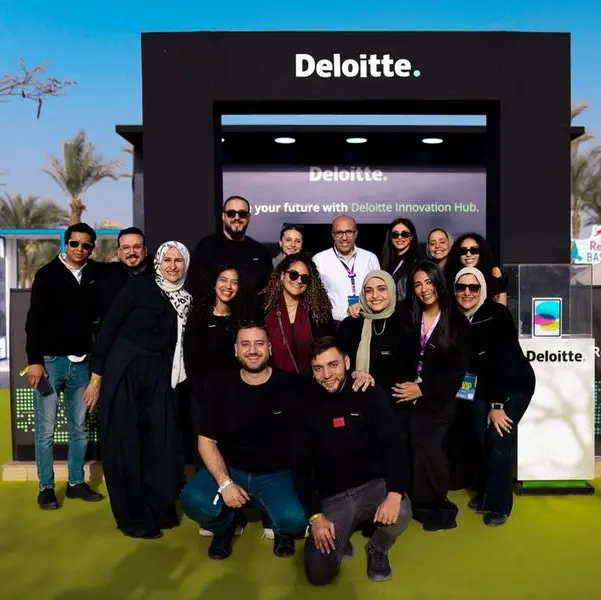PHOTO
- Construction to begin next month, to be completed in the second half of 2022
- New plant will initially produce 6,500 fuel cell systems a year and aims to gradually increase capacity in line with market demand
- Investment advances the Group’s global hydrogen leadership and supports its push into China’s rapidly growing hydrogen industry
Dubai: Hyundai Motor Group (the Group) announced today that it signed an investment contract with the government of Guangdong Province to establish an offshore fuel cell system production facility in Guangzhou, China. The investment advances the Group’s global hydrogen leadership and supports its push into China’s rapidly developing hydrogen industry.
Attendees at the signing ceremony included Kwang Guk Lee, President and Head of China Operations at the Group; Hyuk Joon Lee, Senior Vice President and Chief Government Affairs Officer of Hyundai Motor Group China Ltd.; Lin Keqing, Executive Vice Governor of Guangdong Province; Hu Hong, Vice Mayor of Guangzhou Municipal Government; and Chen Yong, District Chief of Huangpu District Guangzhou Municipal Government.
Construction is scheduled to begin next month and will be completed by the second half of 2022. The plant will be the Group’s first fuel cell production base outside of Korea, with the initial capacity to produce 6,500 units of fuel cell systems per year. The Group will gradually increase the capacity in line with market demand.
China’s rapidly growing fuel cell system industry
The Guangzhou plant will leverage the Group’s extensive expertise in fuel cell system production to secure a technological leadership position in China’s rapidly developing hydrogen industry. At the new plant, the Group will manufacture the same proven fuel cell systems that are used for Hyundai Motor’s NEXO fuel cell electric SUV.
Moreover, the Group will work with Chinese companies to participate in the Guangdong government’s hydrogen-related pilot project and initiatives, which will help Hyundai secure a competitive advantage in China’s hydrogen industry. Global companies from Japan, Germany, the UK and other countries have also been working with the Chinese partners to develop technology related to fuel cell vehicles and to advance the local hydrogen industry.
In October 2020, the China Society of Automotive Engineers released a technology roadmap, under the guidance of the Ministry of Industry and Information Technology. The roadmap reflects China’s ambition to foster a hydrogen economy, adding that the country aims to have 1 million FCEVs on its roads by 2035 centering on commercial vehicles.
The Group’s hydrogen strategy
In December 2018, Hyundai Motor Group announced its own long-term roadmap, ‘Fuel Cell Vision 2030’, to reaffirm its commitment to accelerate the development of a hydrogen society by leveraging its global leadership in fuel cell technologies. As part of this plan, the Group aims to produce 700,000 fuel cells annually to meet demand from various industry sectors.
The Group has decades of experience in fuel cell system development, having introduced the world’s first mass-produced fuel cell electric vehicle, the ix35, in 2013, followed by the second-generation NEXO, in 2018. The Group also successfully delivered the first seven units of its XCIENT Fuel Cell trucks, the world’s first mass-produced fuel cell electric heavy-duty truck, to customers in Switzerland in late 2020.
As part of the Group’s effort to foster zero-emission society, Hyundai recently launched HTWO, a new brand to represent its world-leading hydrogen fuel cell system. It has also strengthened its research and development capabilities and partnerships across a multitude of industries to lead development of the hydrogen economy.
-Ends-
About Hyundai Motor Company
Established in 1967, Hyundai Motor Company offers a range of world-class vehicles and mobility services in more than 200 countries. Hyundai Motor sold more than 4.4 million vehicles globally in 2019, and currently employs some 120,000 personnel worldwide. The company is enhancing its product lineup with vehicles designed to help usher in a more sustainable future, while offering innovative solutions to real-world mobility challenges. Through the process Hyundai aims to facilitate ‘Progress for Humanity’ with smart mobility solutions that vitalize connections between people and provide quality time to its customers.
More information about Hyundai Motor and its products can be found at:
http://worldwide.hyundai.com or http://globalpr.hyundai.com
Disclaimer: Hyundai Motor Company believes the information contained herein to be accurate at the time of release. However, the company may upload new or updated information if required and assumes that it is not liable for the accuracy of any information interpreted and used by the reader.
© Press Release 2021
Disclaimer: The contents of this press release was provided from an external third party provider. This website is not responsible for, and does not control, such external content. This content is provided on an “as is” and “as available” basis and has not been edited in any way. Neither this website nor our affiliates guarantee the accuracy of or endorse the views or opinions expressed in this press release.
The press release is provided for informational purposes only. The content does not provide tax, legal or investment advice or opinion regarding the suitability, value or profitability of any particular security, portfolio or investment strategy. Neither this website nor our affiliates shall be liable for any errors or inaccuracies in the content, or for any actions taken by you in reliance thereon. You expressly agree that your use of the information within this article is at your sole risk.
To the fullest extent permitted by applicable law, this website, its parent company, its subsidiaries, its affiliates and the respective shareholders, directors, officers, employees, agents, advertisers, content providers and licensors will not be liable (jointly or severally) to you for any direct, indirect, consequential, special, incidental, punitive or exemplary damages, including without limitation, lost profits, lost savings and lost revenues, whether in negligence, tort, contract or any other theory of liability, even if the parties have been advised of the possibility or could have foreseen any such damages.
